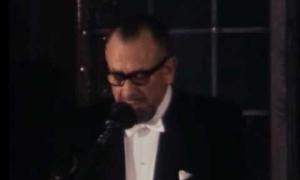Five reasons to NEVER become a speechwriter
March 30, 2016
A veteran speechwriter confesses that, while speechwriting can in theory be the best of jobs—in practice, it's often the worst.
The PR consultant Fraser Seitel recently penned a piece about why all frustrated PR pros, wannabe HR peeps and social media ninjas should become speechwriters. It must have been an early April Fool.
Here I spill the beans on what is likely one of the most misunderstood professions in the world. Speechwriters are the silent profession. We don’t say much. We just write the words, listen and go back to writing. Is that because we are satisfied and happy? No! But as JFK’s speechwriter Ted Sorensen made abundantly clear, you don’t steal the speaker’s thunder and you don’t claim the credit. End of story.
So let us reflect on Seitel’s five reasons one by one. Bear with me.
1. Speechwriters need access, but get none. Frustration abounds.
It is true what Seitel says: Access is power. And it is true too: If a CEO wants to look good (and he/she does), he/she should take time to talk to his/her speechwriter. Yet he/she rarely does and after tons of conferences, seminars, workshops and conversations I can conclude beyond a shadow of doubt that the one main frustration shared by almost all speechwriters is lack of access. We need it. But we don’t get it.
We are obligated to deliver a personal speech that will sway the audience in the general direction of the speaker’s goals—yet we have little to no time with the speaker before he or she reads the speech in the car on road to the podium. So if you want alone time with your speaker, do something else.
2. Speechwriters make money, but not much more than anybody else.
Money – money – money. Must be funny. If only speechwriters had some. Sure some bigshot speechwriters collect huge fees after leaving the White House but that is not the general picture. Speechwriters often perform various other tasks and thus function as any other comm pro. If you are a freelance speechwriter your fees are larger, yet your assignments are few.
We live in a world of authenticity and speechwriters suffer for it. We are the people making a living from putting words in the mouth of other people. We are the dark lords of spin, the masters of the puppet show, the devils of the teleprompter and applause line. We are rarely the enablers of eloquence—or just the ones committed to an audience listening for 20 min. in a two-minute world. It is harsh and at times we cry—silently.
3. Speechwriters are in demand. Yet it is a small niche within a niche.
Speechwriting is a seller’s market, Seitel says. I recently got headhunted for two separate speechwriting gigs. I could entirely change subject matter and sell my soul—and move to The Netherlands—or I could stay within my subject matter—and move to Kenya. Ohhh the choices in a seller’s market!
Truth is speechwriting is a niche. And a small one. Take communication and remove anything but leadership/executive communication. Then remove anything non-verbal. Erase everything in between conferences. Focus on the podium. Speechwriting is the proverbial tip of the iceberg. Even for big corporations, speeches are not a daily thing, and they rarely need a designated speechwriter.
4. Speechwriters are more fulfilled. Wait … WHAT?
True, speechwriting is a creative endeavor and it can be both meaningful and fulfilling. It can. It can also not be. It might just as well be en avalanche of creative energy unleashed and ambitions fulfilled only to be cut-throated, gutted and splashed with numbers paint. It can be the work of great painters such as Monet but it can also be the sheer agony of returning home to see your child having repainted that same beloved Monet piece.
When you write speeches, your words are not your own. Your goals are not your own. The prestige is not yours. The applause does not belong to you. But if the speech fails, the blood is on your hands—and your pen. A speechwriter is only as good as that last speech—and you are neither the judge, nor the owner of your words.
5. Speechwriting is HARD! And speakers don’t know what they want.
So speechwriting is easy, says Seitel? Not much to it, is there? If you can speak, you can write speeches, he says. Can you? Actually you will find that those are exactly the most harmful misunderstandings for a speechwriter. Those are the ones rationalizing why any gatekeeper can gut your work and pass it on with your name still on it. Because they can speaks—so they can write a speech.
No they can’t. No you can’t. Speechwriting is hard. Try writing conversationally in somebody else’s voice. Try adding a strategic communication aim. Try making the audience stay awake. Try making something memorable that will actually make them think and—maybe even act—differently. Try getting it through the layers of bureaucracy of any organization. Try getting it through the lips of the speaker in a manner somewhat resembling what you intended from the start.
Successful speechwriting is not easy. But you will get better with practice. And you just might come to love it—and have a hard time leaving it, despite the 5 reasons listed here. And we’re a tight-knit community—maybe because of them.




